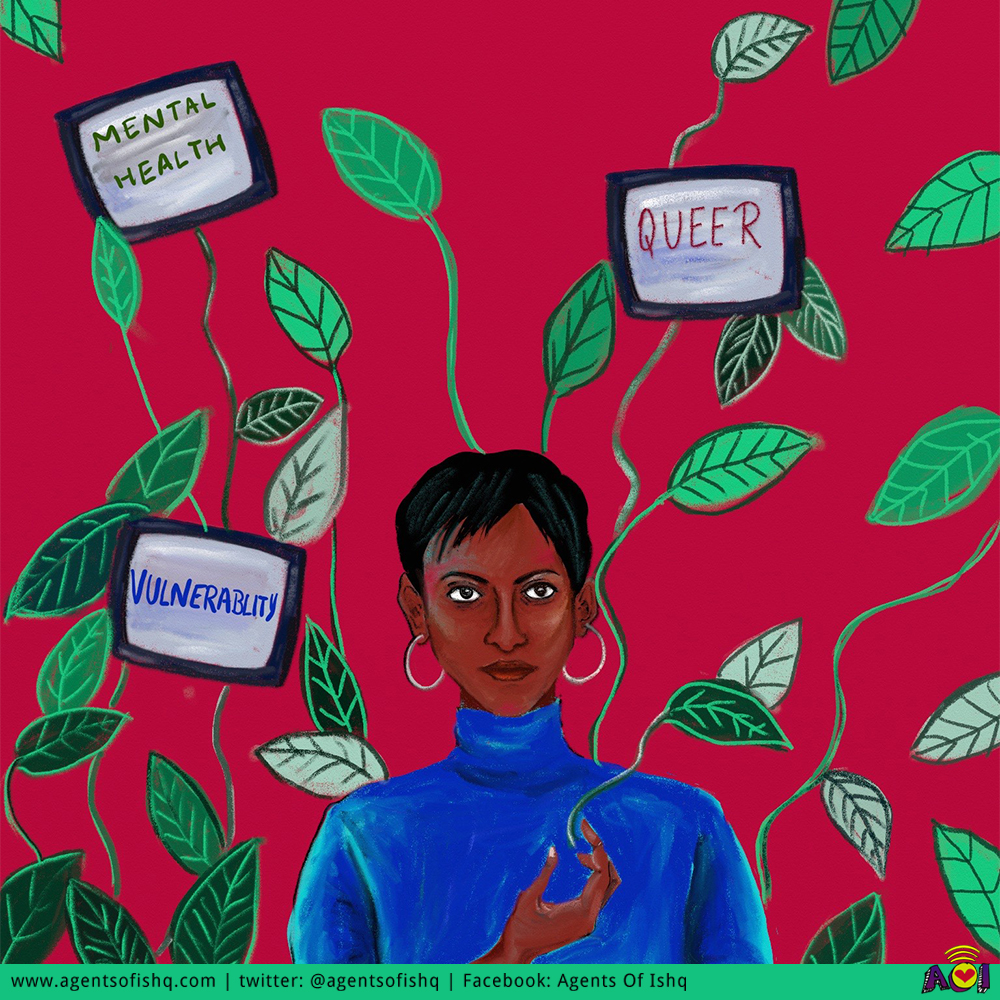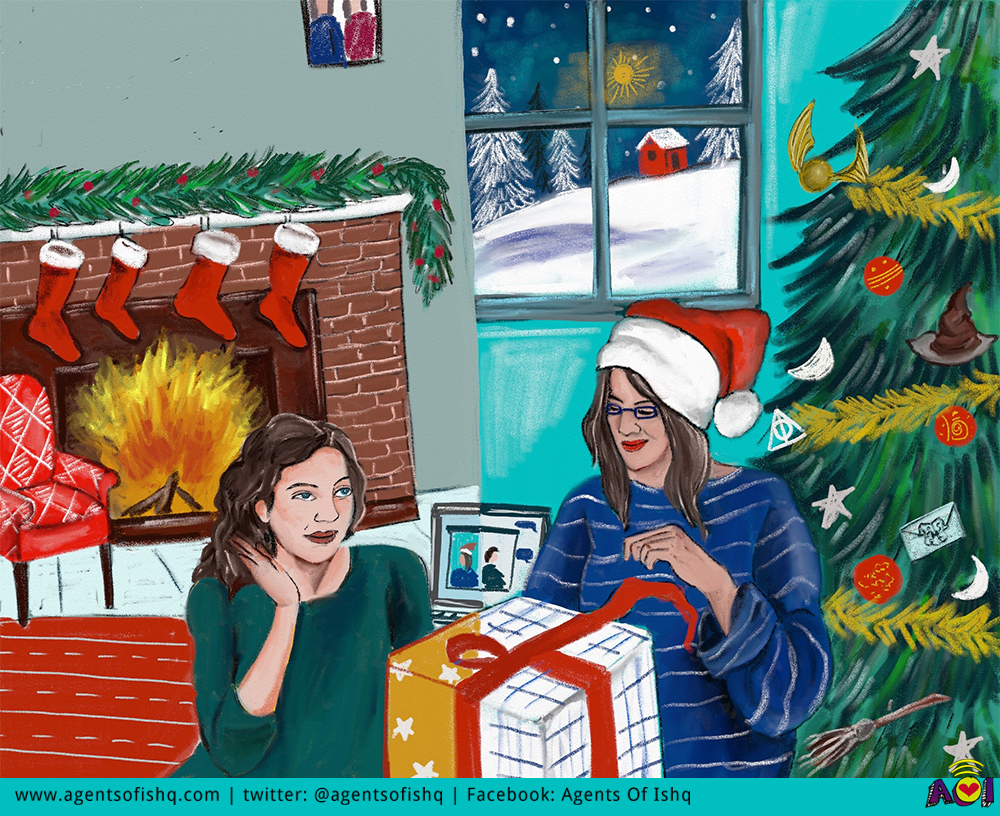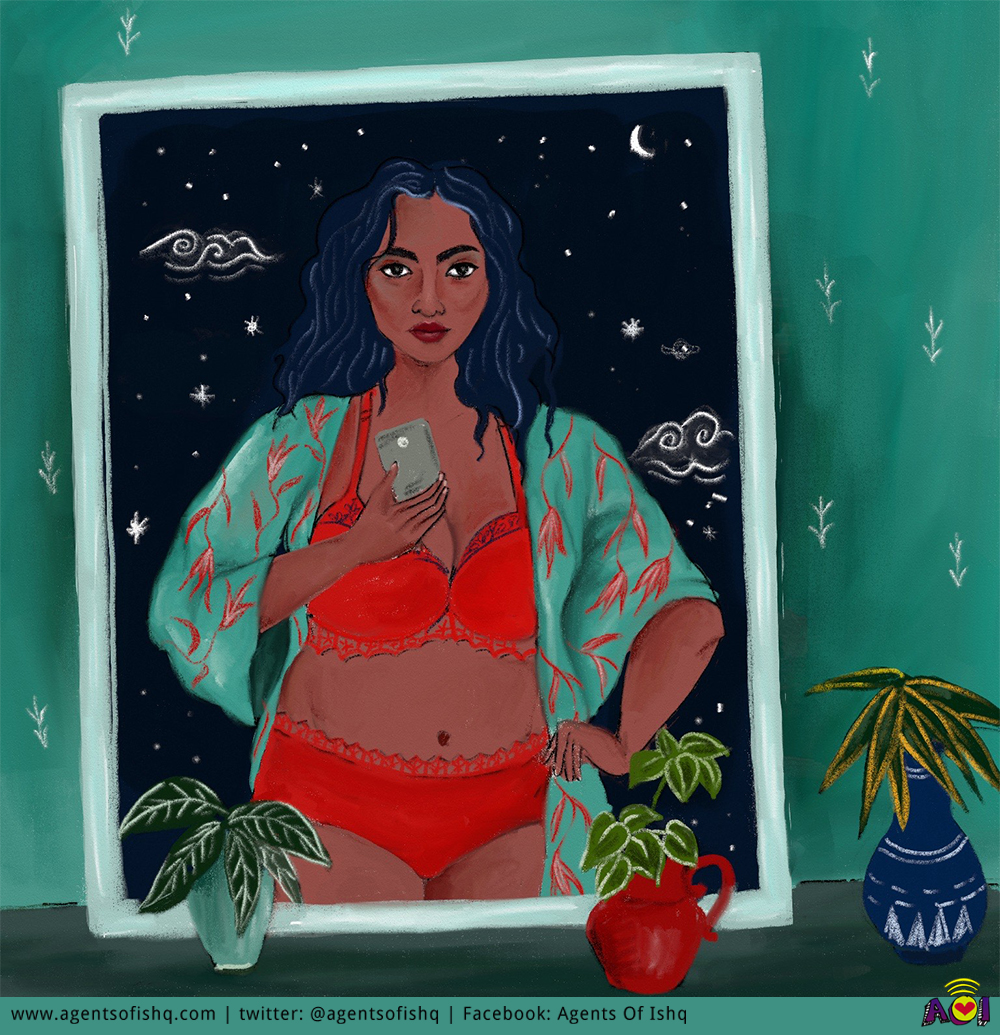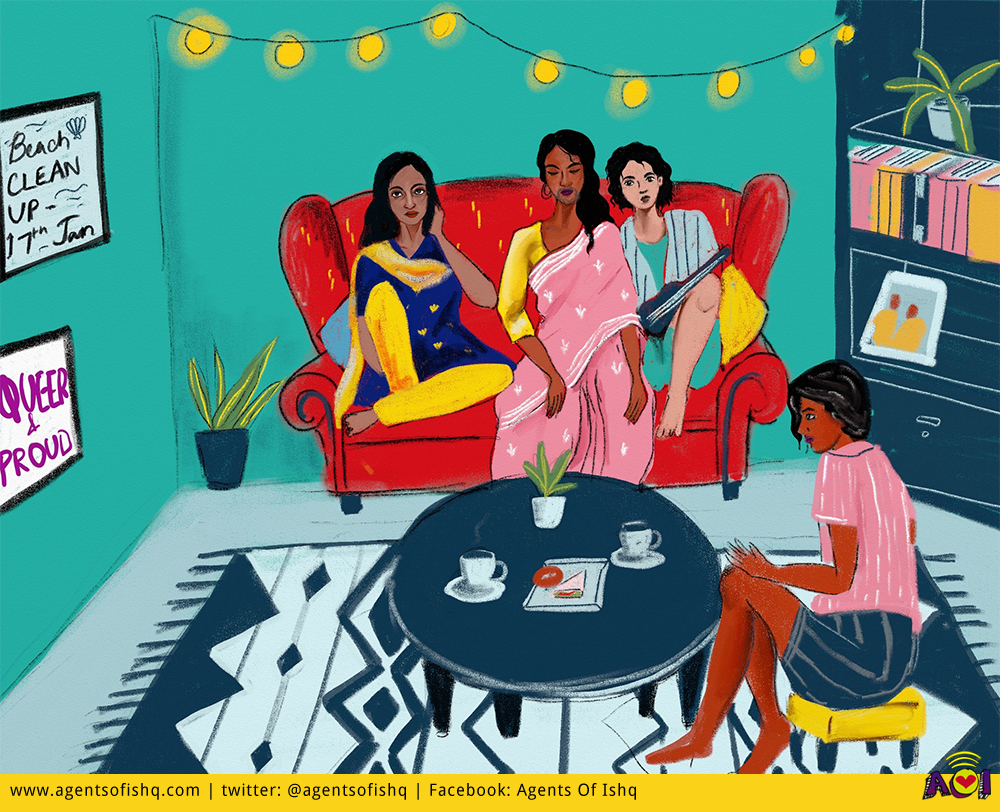Illustrations by Nandini Moitra
Remember the days of Orkut and the excitement that came with uploading your first picture? Or your pehla virtual chat-room experience? A space of anonymity, play, new conversations and perspectives, and above all, new friendships – social media was the jagah for all of this, and more. It helped so many of us find companions, build communities and establish connections across the globe and navigate the criss-cross of digital and physical, yaniki phygital! Some of these communities exist even today, while others have changed – and the internet certainly has! But, Agents, we hope these stories remind you of the pros of phygital relationships, in a world where the cons tend to take over, and perhaps also help us think of what kind of digital world we really want…
“In a sense, we’d known each other much longer”
– YSK, 25, They/Them

I was 18, I came from a small town, I’d moved cities and left my family for the first time to start college. It was a very ‘straight’ world for me; 7 years ago, people around me weren’t talking about polyamory, caste or desire in college. These weren’t conversations my batchmates or friends were having, and I could not possibly have articulated my body as queer, or a body that perhaps needs to have conversations about mental health. These were concepts the Internet introduced to me.
It wasn’t a community that was named. I knew these conversations were happening because they were coming on my Facebook feed, and somehow from one conversation to another – I was in it. At that time, they helped in acknowledging and articulating what was happening with my body. It made me feel like it was okay for me to think about these things, and introduced me to perspectives that were otherwise lacking around me.
What I experienced was the early internet. Social media was new for a lot of people my age, many of us were being vulnerable online. Now there are therapists and trained people talking about mental health online. But back then, it was just independent, personal voices. The internet didn’t have so much morality in it. It was vulnerable. It allowed more room to explore identities, rather than fixing them into set templates and tropes. I wasn’t pointedly reaching out to somebody to discuss queerness or mental health, but it was always there…in undertones and implied. I didn’t know we were making a community when it was getting formed.
I can’t really tell if I made friends or am I still friends with somebody, because these are people in the last 6-7 years I’ve known of, lost touch with, seen elsewhere, then met them again, only to forget once more. So many people that I knew digitally, would happen to meet in person because of somebody else. But in a sense, we’d known each other longer. It’s a process – this feeling of belongingness. But I think this kind of a digital community builds you. These people were the building blocks for who I became and am now. Maybe they don’t know of me and I don’t know of them, but it was and is still a community because we shared something meaningful together and there was care and labour involved.
“It didn’t matter if we met or not. We were all going through that same emo phase and wanted to express ourselves” – Artemisia D, 29, She/Her

I was in 11th/12th grade when I started my Blogspot journey. The blogs had very funny emo- names like The Crimson Orchid, Hyperventilating What What, My Thoughts, My Feelings, etc etc. Initially everyone was only writing daily journals. Then people started doing image based posts, like this is what I wore today, this is the song I’m listening to, short stories, fashion/food reviews, and such. It was a bit weird that people were reading everything about you and you about them. And the next day, you’d see them in school. It was the first time that an online offline clash was happening. But because everyone was on it, it was all accepted.
That was the time that online relationships and making friends in different cities was common. It was a mixed bag community with no way to formalize it, because on Blogspot, you can’t chat. You could only engage through the comments. If you wanted to talk to them, you had to add them as a friend on Facebook. If someone was in the same city as you and got along with you, you could meet them. Everyone had online friends, and so did I.
There was a girl from the North East living by herself in Bombay. I was interested in her writing and lifestyle. I lost touch with her but I know she got into fashion and events as a career. Even back then, she had a peculiar sense of style and a passion for it, which she wrote about. One blogger, she was younger than me and was writing poetry. Right now she lives in New York and is working as a writer. Another girl used to write a blog which was very pop and Bollywood, and now she writes film reviews and reviews of bollywood movies on big entertainment portals. Over the years, you could see the direction they were heading towards. I guess blogging helped us understand what our passions were and we supported each other’s work, in a way, in those comments sections.
It didn’t matter if we met or not. We were all going through that emo phase; we were at that age where we really wanted to express ourselves. Some cool guys from school had given me their sneakers to paint, and I had put it up on the blog to see people’s reactions. Now when I see it, I know where my illustration style started from.
I was getting better and better at blogging and at the peak, my sister and mother found the blog, which made me get off it. Suddenly I was very conscious that I was putting out something that was so personal. I just went private, and after a while stopped completely because no one read it much anymore. And without any validation, you just stop doing things.
“We would talk everyday, so maybe it was that. There was never a minute you felt like you were on your own” – Aylis Emek (23, She/Her, Harlow – UK) and Demi Hudson (25, She/Her, Hull – UK)

The online world is great for friendships. We’re a generation full of anxiety and mental health conditions so there’s a good majority of us that are introverts. It doesn’t take the effort of getting ready and going out, it’s easier to open up about stuff with someone that way because I already feel like I know them. It meant I could get comfortable chatting to people before meeting them in person.
It happened when we first joined the FB page for Potterheads. I was in college, just started…it was a nervous time. My health wasn’t great, and I needed that group of friends I didn’t have. The admins and the friends I still have today were my lifeline. We joined the group thinking it would be fun to host quizzes and stuff, post about things we were anyway reading on…and it was. Sharing this part of our lives with each other, on this FB community–a part we didn’t get to share with others, started off the bond. We could talk about what we loved.
The online platform I think made everyone comfortable with opening up. Noone was shy to talk about anything. There was no line really, haha. And I really liked that. It made it a safe space, and I needed that in my life at that time. Everybody on the group would talk everyday, so perhaps it was that. There was always something being discussed. Always a conversation to jump in on. And whenever anyone was bored, there was a game or something started. So it was a space we started to turn to and count on. There was never a minute you felt like you were on your own.
We started talking about everything, boys, life, and I even introduced Demi to someone I was then talking to. It was a massive step for me. She would always be the first person to go to. We also started a tradition of calling each other every Christmas morning, and opening presents together. These are just fond memories of my teenage years, some of the only ones I have. We just got it, we got each other.
Basically, it was one of the best experiences of my life. I have found friends for life and I know that I can come to any one of them for anything and Aylis has been a massive part of my life, and part of me. There have been bonds made on that group that would be really really hard to break. I have gone through a lot in the past 7 years and Aylis has been a part of that every single step of the way. Every single part of it. Every high, every low.
“I learnt quite early-on how to be a dil-fek fool in love no matter how ‘out of my league’ my interests seemed”
– Hamsi, 28, She/Her, Ichalkaranji – Maharashtra

At 14, I was getting really good at badminton, turning into a sports buff, and getting the hang of Orkut. At the time Saina Nehwal was known only to devoted badminton players – and I created a ‘community’ (Orkut equivalent of a facebook group) for Saina Nehwal fans.. It garnered a lot of members – badminton players, coaches, fans like me, whom I befriended and in whose company I started taking the sport more seriously (and through that, I now realise, taking myself more seriously). One of them trained in close quarters with Saina Nehwal and claimed to have access to her phone number. Our friendship grew over time and after a lot of insistence, on perhaps my 15th birthday, he finally shared with me her phone number! The number was legit and I got to have a conversation about making it big professionally at badminton with Saina Nehwal before she became the Saina Nehwal!
It was also around the same time that I came to know of a ‘butterfly’ swimmer from Kolhapur, not very far from my town, who had qualified for the Olympics at baali umar of 16! It was Virdhwal Khade, for those curious to know. So of course I created a community for his fans too, the first and only on Orkut. And just the next day, guess what happened? Virdhawal Khade himself discovered it and joined in! Dil toh went full dhak dhak at this. I got talking to him and a few of his friends, who had nothing short of press mentions of their own talents at different strokes (ahem- at swimming). And so began my first ever stint at flirting with teenage celeb boys with hot jaw-lines and tan mid-riffs! From falling asleep to text-exchanges under the blanket risked on a mobile-phone borrowed from mum, to graduating to phone calls, to concocting how to actually meet without small-town eyes taking too much notice, to eventually being dumped quite arrogantly for being a non-celeb, I learnt quite early-on how to be a dil-fek fool in love no matter how ‘out of my league’ my interests seemed.
With all this knowledge of professional training for swimmers and badminton players from these communities, I found a badminton center away from home to enroll myself into. That was the first time I stepped away to a big city from my hometown. I got a taste of having uncommon ambitions and grew more fond of dreaming big without thinking of ‘big’ as success and money. I never made it as a badminton professional either, but boy, did I learn to flirt under the pretext of sports!
Boudoir art helped me feel safe about myself
– Abel, 20, Bisexual, She/Her

I have body image issues which led me to share boudoir pictures on my anonymous social media accounts. The fact that it’s taboo gave me the kick to do it more and more. Being anonymous meant I didn’t have to worry about who might know my real identity and reveal it to my family, friends etc. I coud segregate this part of my life completely from my personal one. Some people did suspect I was into this field, but did not have any evidence; others didn’t know at all. The anonymity of the digital world gives me this power over people because they are not aware of who I am–this makes me mysterious.
I have always wanted to explore different things and art forms, boudoir was just a part of it. I have severe anxiety, but somewhere, the appreciation, criticism and validation of boudoir photography gave me confidence. I started taking self portraits in 2019 and began working on my boudoir art with an amazing photographer in 2020. He helped me find other photographers, through his instagram networks, who are safe and respectful towards individuals in this art field. This changed my life completely. My thinking regarding nudity changed and it helped me grow as a person, because nudity is not something to be sexualised or objectified. It is about exploring, trusting yourself and as I am growing from within, it has only made me feel more powerful, safe and close to myself.
I felt like I finally had power over myself, my decisions and the ability to do what I want. I wanted to explore myself via this art form and it did excite me because I was the youngest individual in the community to grow so fast. People noticed me, my vulnerability; they appreciated me, and criticised me, but that only made me feel important and determined to become better. The excitement is still there and it will never fade away.
I build a lot of friendships and connections due to this field. I have met with people who give me positive criticism, encourage me and love my art. I have friends who support me, give me advice and help me grow in this field, and I am so thankful to the digital medium due to which I could connect to them. I have learned how I can improve myself and see different worlds to learn more. It has been an amazing journey to know them, learn more about their perceptions and build connections which make me feel safe about myself and my art.
“It gave people a way to be together in a more open-ended way”
– Sumit Kumar, gay man (he/him), 29, Co-founder The QKnit

My queer connections started offline actually, because there weren’t any phone apps when I was really young. Without apps, I met other queer men through cruising points. You’d hear of Maheshwari Udyan and you’d go and connect with someone. You’d talk and they might connect you to others, or tell you that Andheri MacDonald’s is also a meeting point, for example. And through these encounters, I also began to go for queer community events and meetups.
For me, those conversations felt more ‘real’; you could sense feelings, emotions and intentions. Because you know, even if someone is faking it, they are in front of you and you can make your own understanding. Even a simple world like ‘hi’ carries unspoken meaning. You see the whole person.
Connecting purely in online spaces changed things. I feel that online, there is a lot more ego, a lot more assumptions about a person based on looks, or English, or class, etc. People are impatient – they feel if it’s not an instant match, they’d rather move on to another choice. You don’t wait to understand anything about a person. It’s thak – you don’t fit my categories, so blocked. So rejection has become a big and painful experience, among many young queer people I know. Of course each of us has a preference of whom we are attracted to, but online it becomes very hard and categorical and the environment is very derogatory and can make you feel bad. People say things like ‘no pansies’, ‘no sissies’, ‘ no fat’. Rejection feels very personal and harsh, like there is nothing else to you. So that creates a lot of violent feeling. People feel hurt then they feel vengeful. People fake your profiles using your photos, creating negative impressions of you, blackmailing you with your nudes.
There was a time when Facebook groups were a warm place where we could talk openly. But in many queer online spaces it started to become increasingly polarized, with political views discussed divisively. And you could see all kinds of prejudice; biphobia, especially, was very prevalent. So it is supposed to be a way to connect but sometimes it rather feels very hostile and unwelcoming also.
In 2015, we started the QKnit to just create greater awareness about LGBT issues. It was supposed to be a YouTube channel about queer events. It was difficult to sustain so we started doing other events which were more ‘ordinary’ or regular – just casual where you could come and talk, not a big scene where everyone has to dress up well and be cool. But then we began to feel, we also want to be having the conversation with other people, with allies – addressing the LGBT community was not feeling enough at that point — like we want to be part of the whole of society, from our perspective, right?
We started to do other types of activities – like beach clean up, or sports. So we were meeting to do something together, and feel connected in a different way, not just through sexuality. It was organised by LGBT people but it was open to others as well and some straight people would also come with their friends.
Then we began to hold public events – like a discussion in a public space – which we called Queer Katta. LIke talking about HIV or gender, the elections and important issues in that, or sometimes just talking about our past relationships and what they meant for us. We would do it in say a public space like Bandstand. Once some older ladies who were passing by came and sat with us, and they also got involved in the discussion. So that way, many times, in that public space, people who we may not connect with online, would become curious and join in for some time and you felt you are not just in your own world and here, interacting, we are accepting each other.
In a discussion, face to face, you might argue, but it’s not a straight negation, like online. Rather, it was more open-ended.
That’s how the idea of a physical space grew in our minds, which is created by LGBTQ people, giving a space that is friendly for them, but which also is open and inclusive to everyone. So we found a space in Mira Road, and started Cafe Gugtagu.It had books and games and we did talks and events.
But soon after we started, the lockdown happened. We didn’t want the space to fizzle out. Meanwhile we realised that there were many people in the area that were not getting food, like other schemes and help were not reaching them.We decided then that we will convert the cafe into a community kitchen. That felt good. We were connecting together to do something that would help people around us but which was also keeping the Guftagu space alive.
The online space is a good space to communicate, to connect and network. But for me, for us, creation of community has really been more meaningful offline. And in that, the relationships in the community and of the community with society keeps growing in different ways. You could say it is more fluid!
































































































































































































































































































































































































































































































































































































































































































































































































































































































































































































































































































































































































































